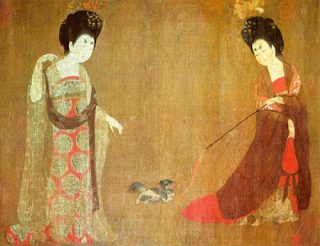So last night I was talking about music theory with Andy, when he mentioned he doesn't know how to read music. This was mind boggling to me, since he plays in a band and writes songs, and is multi-instrumental (bass, guitar, drums, saxophone). I remember a lot of musicians I've met in Jazz and band were similar. Very creative, but can't tell you the difference between C or G on sheet music. Whereas I started learning classical piano by age 5, and spent about 10 years playing everything from Beethoven to Bach. Our approaches are completely different. Mine is very mental and structured. His is very free and instinctual. I watched a short Youtube video with Andy that explained the difference between the Melodic and Harmonic scales, and he almost fell asleep from boredom. *I thought the guy was hilarious, especially when explaining the devil's interval...
What strikes me is how theory and skill do not an artist or musician make. I've never written a song in my life, even though I love fiddling on the guitar and teaching myself how to play F diminished chords and then sharing my exciting discovery with Andy. Whereas he doesn't really feel like he needs to learn theory, because he would just figure out where on the guitar he wants his fingers to be to produce the sound he wants in his music. I feel that it's the same with art. Just because I spent 7 years learning classical techniques doesn't really make me an artist. With time and practice, I'll be lucky to turn out a decent painter. It still doesn't make me an artist. Because art is something that is beyond the techniques, something inborn that has to be expressed outwards. And sometimes a person can be completely untrained and still be an artist. And other times, a very well trained person can have no artistic urge to produce other than just copying what he or she sees. In some ways, the classical painters are like the classical musicians I know and was - able to reproduce different beautiful interpretations of nature or classical song. But there is something to be said about the simple well written song that consists of just 3 chords, perfectly executed with meaningful lyrics.
One of my favorite musicians from Fleet Foxes, Robin Pecknold, sums it up nicely here, on what it is like to learn music theory at Columbia University after selling many alums:
"College has helped me practically in terms of a more legit arts education and some music theory stuff that is helpful when arranging songs. But it was also paralyzing at times. In indie rock you can throw some flutes on a song and it sounds high minded but that wouldn’t play in academia or academic art music at all, so for a while I had no idea what to do or which path I wanted to go down. For a second I thought about becoming a composer but I realized I would be really out of my depth, and I really love good songwriting and interesting melody and the human voice too much to try and move into that world, I’d be a pretender."
 |
| Picture from Billboard.com |
It's interesting because essentially, by learning music theory, it's made it somewhat harder for Pecknold to be as naturally creative. What he thought of as meaningful or special in the past, is now cliche or simplistic. Sometimes I wish I could go back and unlearn everything I learned in classical art, so I could return to the simple joy that painting used to be for me. But in other ways, by raising the bar, I have a lot to explore. At the heart of the matter, is deciding what I want to do with my work, whether it is to continue down the academic path, or to be more free and exploratory. Both are valid, but coming to terms with my own limitations as an artist as well as my natural inclinations will likely define my work for the next few years. I hope that Fleet Foxes will return with more music, but I also hope I will have an open mind and be willing to accept their stylistic changes.











